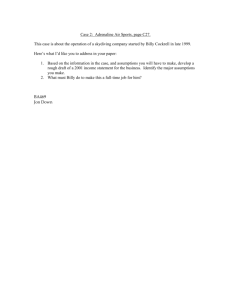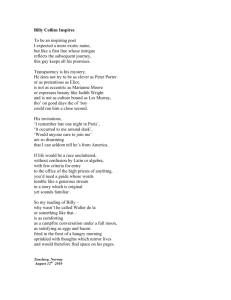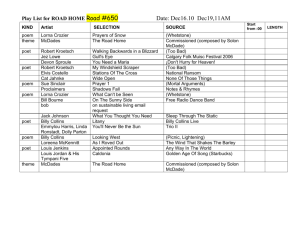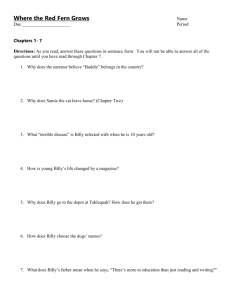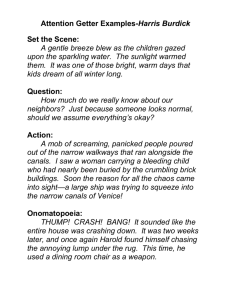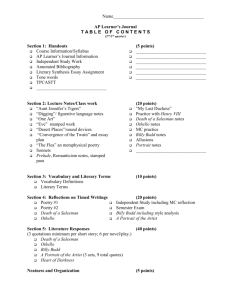PCQE - Fife Direct
advertisement
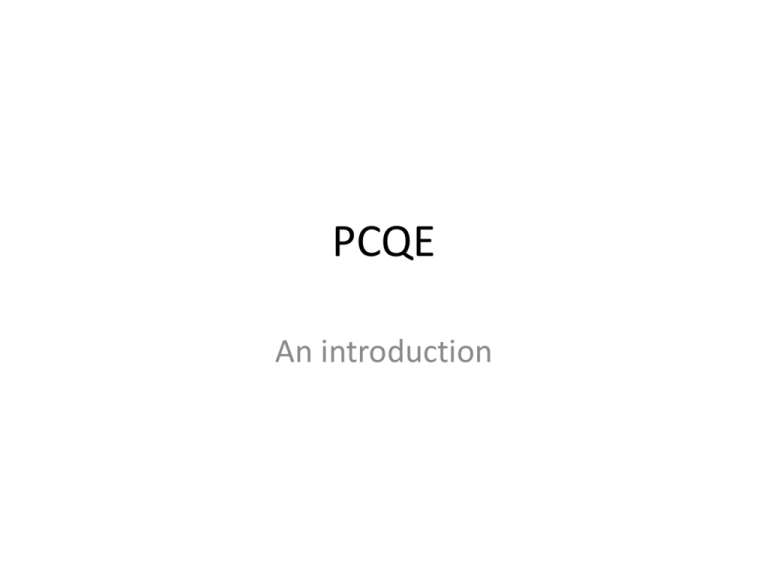
PCQE An introduction The Building Block Approach • Literature essays are like: • Lego models The PCQE Point Context Quotation Explanation • • • • Think of the PCQE as the basic building block of a critical evaluation. Each block consists of: POINT - which relates to the question you are asked, or the purpose of your essay. CONTEXT – this explains what is going on at the time of the quotation. QUOTATION - To prove this point, you must have evidence, a quote, from the text. EXPLANATION - which shows why the quotation proves the point you are trying to make. You should also pick out words, expressions, techniques from your quotation which will back up ideas for your essay question. The Basic Plan Introduction o Name the work and author o o o Refer to the question or task Give a brief account of plot Give a brief account of theme Body of the essay o 3-6 PCQEs - always referring to the task Conclusion o o o o Name the work and author Refer to the task Sum up points already made. Give a personal reaction to the text. “Write about a play you have read in which a character is unhappy. Show the reasons for this unhappiness.” Billy is unhappy because his mother doesn’t seem to love him enough. When Billy comes home from delivering his papers before going to school, his Mum talks to him: “Mrs Casper: You’ve not got a fag on you have you? There’s tea mashed if you want a cup. I don't know if there’s any milk left. (Billy goes to pour himself a cup of tea, but there is none left.) Mrs Casper: Do me a favour love and run to the shop for some cigarettes... Just tell him to put it in the book and I’ll pay him at the weekend... Billy: I’m not Mam, I’ll be late for school. Mrs Casper: Just you wait till tonight.” Billy’s mum doesn’t seem to care that there is no tea left for Billy, even though he is tired and cold. She also doesn't care about him smoking because she asks for one of his cigarettes. She doesn’t mind him being late for school to go messages, or that he’s embarrassed about asking for tick. When he refuses, she threatens him. All this will make Billy very unhappy. “Many poems are concerned with a sense of loss or deep sadness at a particular event. Examine the techniques by which a poet, in one poem, conveys those emotions.” The poet makes interesting use of word choice throughout the poem to convey a sense of sadness. (Context) When the boy is waiting in the sick bay he listens to the schoolbell ringing: • (Point) • “Counting bells knelling classes to a close” (Explanation) The choice of the word “knelling” has connotations of church and funeral services and helps to establish a sense of sadness. • (Quote) “Othello is a character of many contradictions. Show how his positive qualities diminish as the play progresses, and his negative qualities show themselves.” Othello shows his great love for Desdemona at the beginning of the play. For example, after beating the Turks and meeting his wife in Cyprus, Othello greets her with happiness and joy, and says to her: “All hell’s from heaven. If it were now to die, ‘twere now to be most happy; for I fear my soul hath her content so absolute that not another comfort like to this succeeds in unknown fate.” Othello’s language here is beautiful and he speaks very romantically. He tells Desdemona that if he were to die at that moment he would die happy, and his “soul is content”, suggesting that his life would mean nothing without her and that the are bonded spiritually. When Othello says that his bliss may lead to an “unknown fate”, his remark is very prophetic and ironic, since it is ultimately his great love for Desdemona which destroys him. Critical Essay Question • Choose a poem which vividly describes a character. Briefly state who the character is and then go on to show how the poetic techniques used make the description vivid. • In your answer you must refer to the text and to such relevant features as: word choice, tone, imagery, structure, content, rhythm, theme or any other appropriate feature. • Point: The poet uses the image of a gorilla to create a vivid picture of the “Brooklyn Cop”. • Context: In the opening line we are told that the cop is: • Quote: “Built like a gorilla” • Explanation: This simile creates a vivid picture of the cop as someone who is intimidating, uncivilised, perhaps territorial and violent. Poetry essays and analysis: organising techniques The poet achieves his purpose through FIGURATIVE LANGUAGE The poet achieves his purpose through STRUCTURE Poetic techniques The poet achieves his purpose through WORD CHOICE The poet achieves his purpose through STANCE
